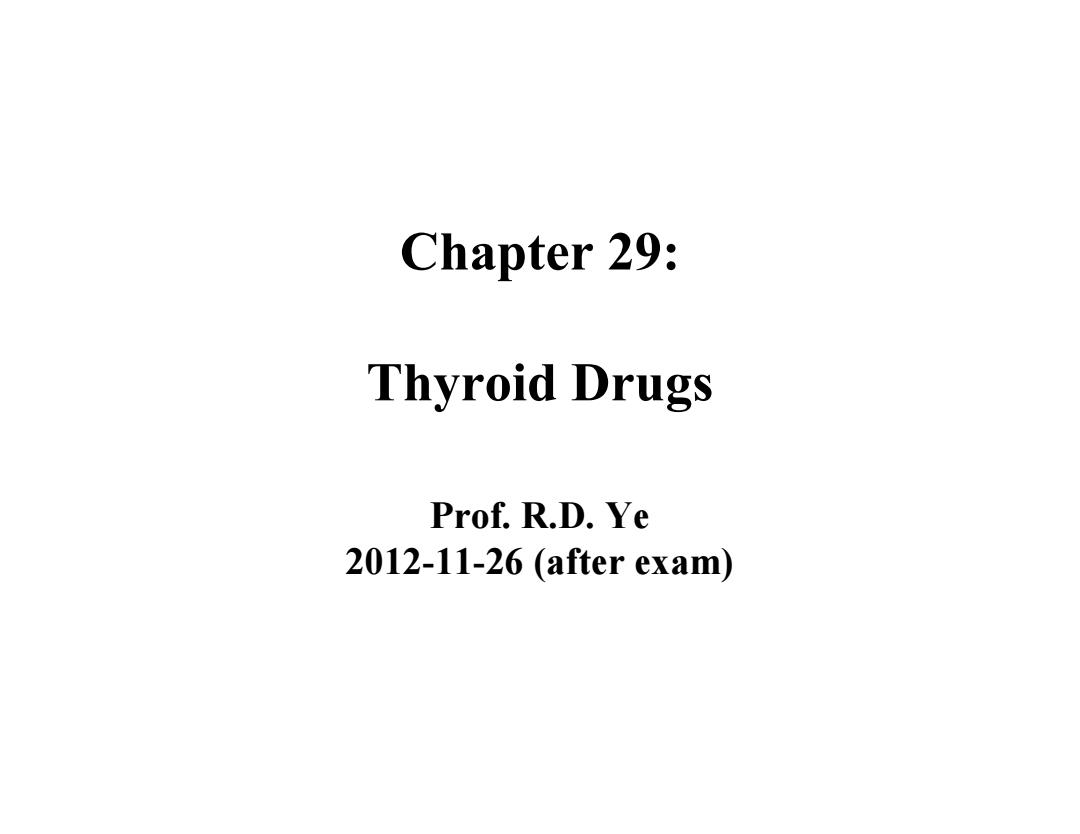
Chapter 29: Thyroid Drugs Prof.R.D.Ye 2012-11-26(after exam)
Chapter 29: Thyroid Drugs Prof. R.D. Ye 2012-11-26 (after exam)
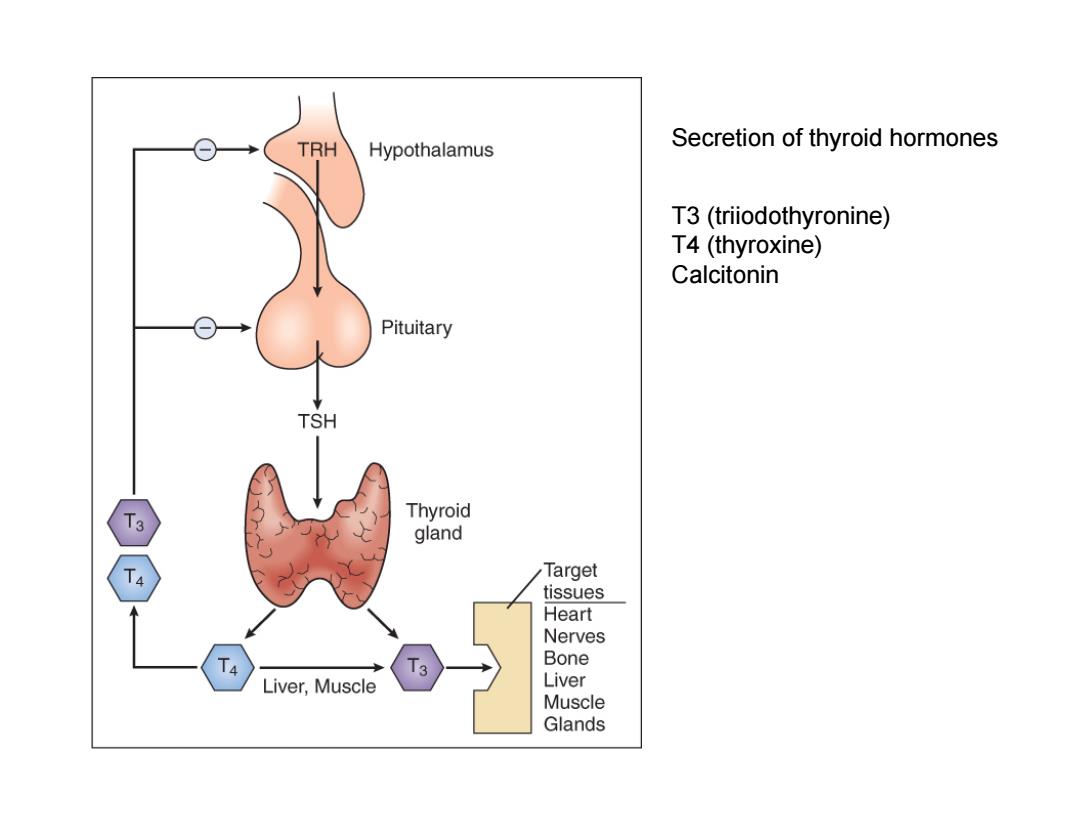
TRH\ Hypothalamus Secretion of thyroid hormones T3(triiodothyronine) T4(thyroxine) Calcitonin Pituitary TSH T3 Thyroid gland Target tissues Heart Nerves TA Bone Liver,Muscle Liver Muscle Glands
Secretion of thyroid hormones T3 (triiodothyronine) T4 (thyroxine) Calcitonin
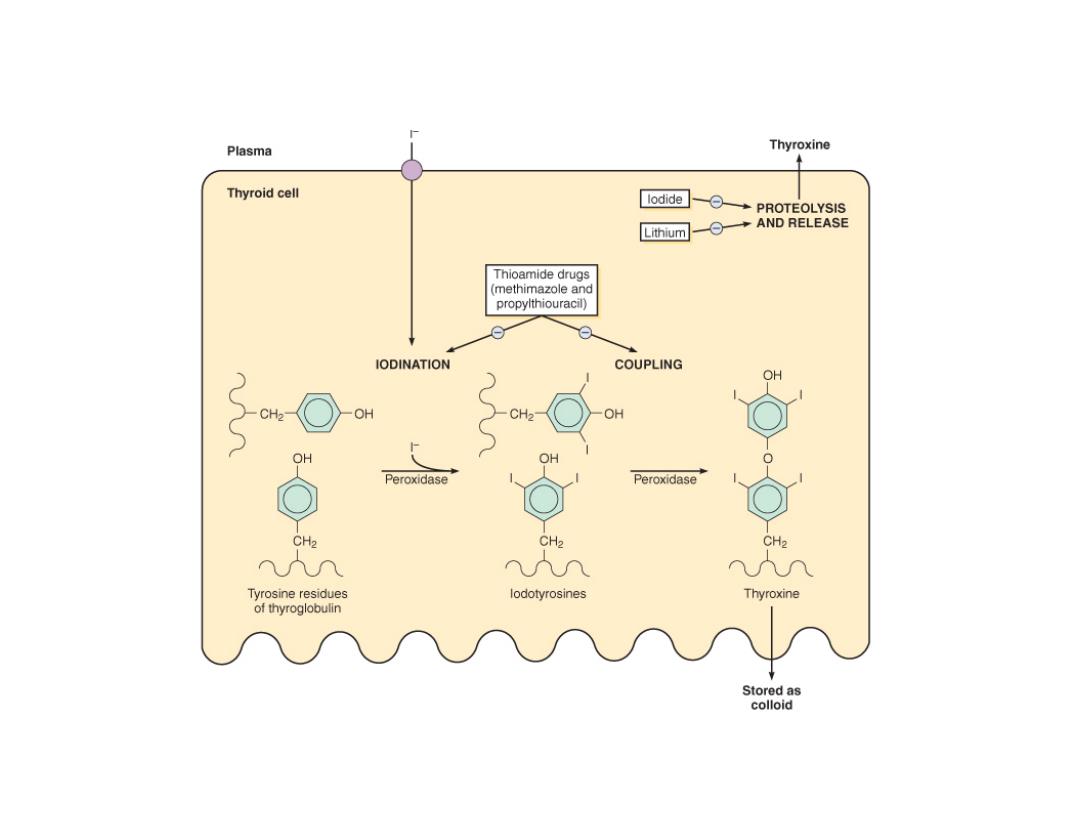
Plasma Thyroxine Thyroid cell lodide O→PROTEOLYSIS ⊙→ AND RELEASE Lithium Thioamide drugs methimazole and propylthiouracil) IODINATION COUPLING OH CH2 OH CH2 OH OH Peroxidase Peroxidase CH2 CH2 CH2 Tyrosine residues lodotyrosines Thyroxine of thyroglobulin Stored as colloid
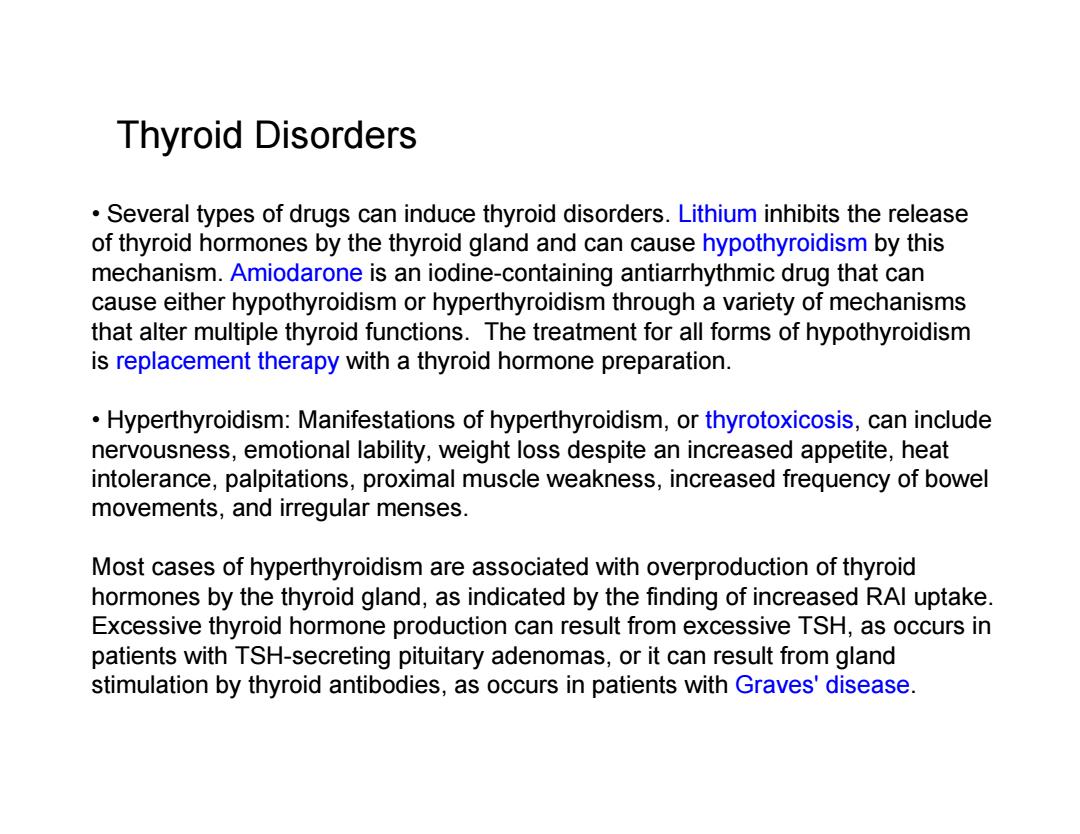
Thyroid Disorders Several types of drugs can induce thyroid disorders.Lithium inhibits the release of thyroid hormones by the thyroid gland and can cause hypothyroidism by this mechanism.Amiodarone is an iodine-containing antiarrhythmic drug that can cause either hypothyroidism or hyperthyroidism through a variety of mechanisms that alter multiple thyroid functions.The treatment for all forms of hypothyroidism is replacement therapy with a thyroid hormone preparation. Hyperthyroidism:Manifestations of hyperthyroidism,or thyrotoxicosis,can include nervousness,emotional lability,weight loss despite an increased appetite,heat intolerance,palpitations,proximal muscle weakness,increased frequency of bowel movements,and irregular menses. Most cases of hyperthyroidism are associated with overproduction of thyroid hormones by the thyroid gland,as indicated by the finding of increased RAl uptake. Excessive thyroid hormone production can result from excessive TSH,as occurs in patients with TSH-secreting pituitary adenomas,or it can result from gland stimulation by thyroid antibodies,as occurs in patients with Graves'disease
Thyroid Disorders • Several types of drugs can induce thyroid disorders. Lithium inhibits the release of thyroid hormones by the thyroid gland and can cause hypothyroidism by this mechanism. Amiodarone is an iodine-containing antiarrhythmic drug that can cause either hypothyroidism or hyperthyroidism through a variety of mechanisms that alter multiple thyroid functions. The treatment for all forms of hypothyroidism is replacement therapy with a thyroid hormone preparation. • Hyperthyroidism: Manifestations of hyperthyroidism, or thyrotoxicosis, can include nervousness, emotional lability, weight loss despite an increased appetite, heat intolerance, palpitations, proximal muscle weakness, increased frequency of bowel movements, and irregular menses. Most cases of hyperthyroidism are associated with overproduction of thyroid hormones by the thyroid gland, as indicated by the finding of increased RAI uptake. Excessive thyroid hormone production can result from excessive TSH, as occurs in patients with TSH-secreting pituitary adenomas, or it can result from gland stimulation by thyroid antibodies, as occurs in patients with Graves' disease
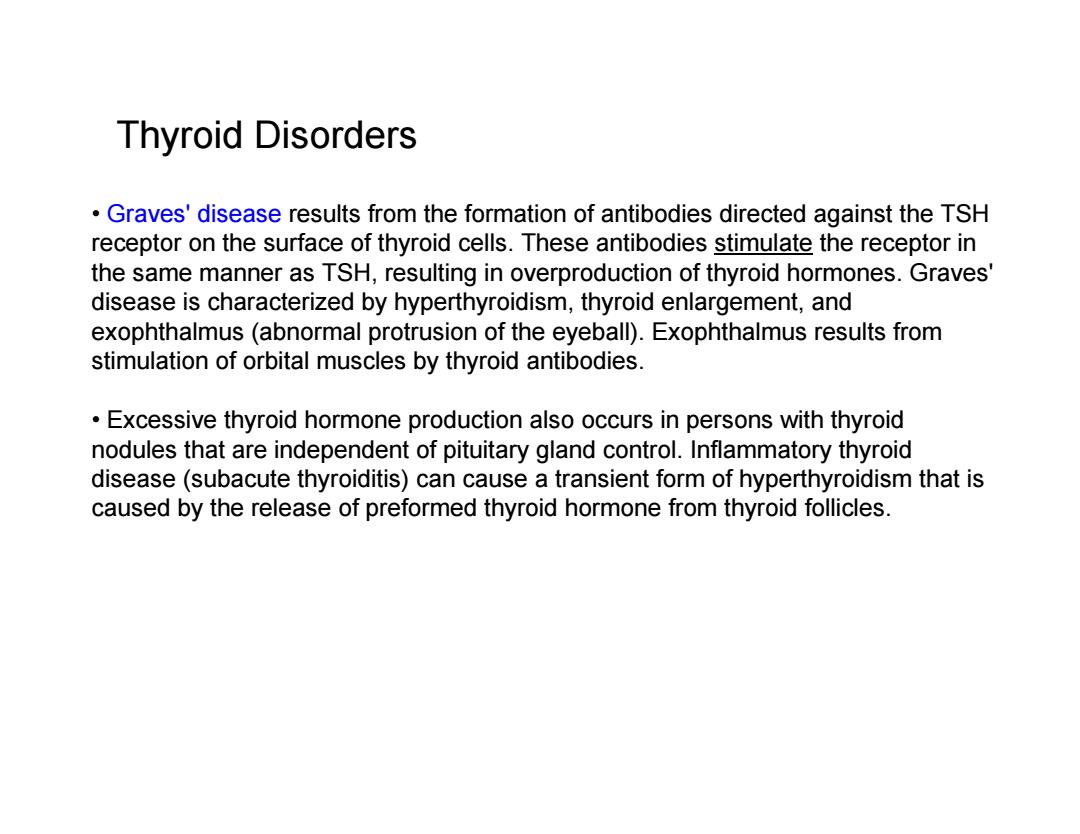
Thyroid Disorders Graves'disease results from the formation of antibodies directed against the TSH receptor on the surface of thyroid cells.These antibodies stimulate the receptor in the same manner as TSH,resulting in overproduction of thyroid hormones.Graves' disease is characterized by hyperthyroidism,thyroid enlargement,and exophthalmus(abnormal protrusion of the eyeball).Exophthalmus results from stimulation of orbital muscles by thyroid antibodies. Excessive thyroid hormone production also occurs in persons with thyroid nodules that are independent of pituitary gland control.Inflammatory thyroid disease(subacute thyroiditis)can cause a transient form of hyperthyroidism that is caused by the release of preformed thyroid hormone from thyroid follicles
Thyroid Disorders • Graves' disease results from the formation of antibodies directed against the TSH receptor on the surface of thyroid cells. These antibodies stimulate the receptor in the same manner as TSH, resulting in overproduction of thyroid hormones. Graves' disease is characterized by hyperthyroidism, thyroid enlargement, and exophthalmus (abnormal protrusion of the eyeball). Exophthalmus results from stimulation of orbital muscles by thyroid antibodies. • Excessive thyroid hormone production also occurs in persons with thyroid nodules that are independent of pituitary gland control. Inflammatory thyroid disease (subacute thyroiditis) can cause a transient form of hyperthyroidism that is caused by the release of preformed thyroid hormone from thyroid follicles
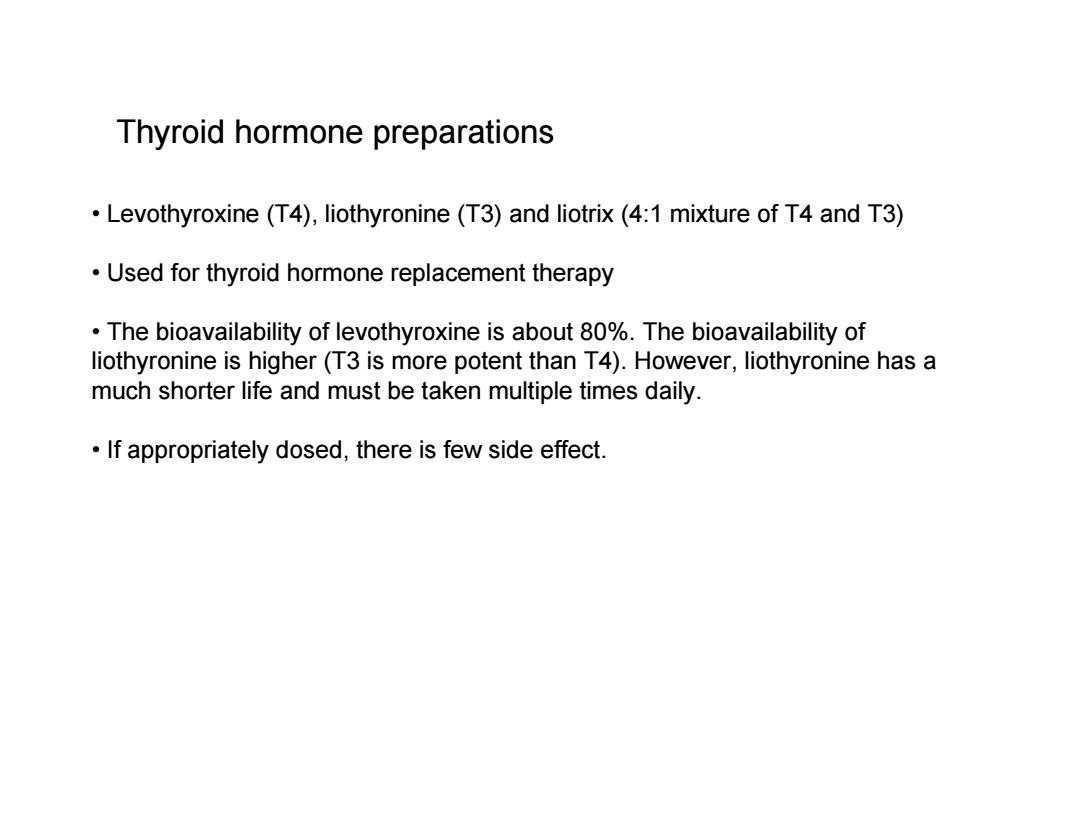
Thyroid hormone preparations Levothyroxine (T4),liothyronine(T3)and liotrix(4:1 mixture of T4 and T3) Used for thyroid hormone replacement therapy The bioavailability of levothyroxine is about 80%.The bioavailability of liothyronine is higher(T3 is more potent than T4).However,liothyronine has a much shorter life and must be taken multiple times daily. If appropriately dosed,there is few side effect
Thyroid hormone preparations • Levothyroxine (T4), liothyronine (T3) and liotrix (4:1 mixture of T4 and T3) • Used for thyroid hormone replacement therapy • The bioavailability of levothyroxine is about 80%. The bioavailability of liothyronine is higher (T3 is more potent than T4). However, liothyronine has a much shorter life and must be taken multiple times daily. • If appropriately dosed, there is few side effect
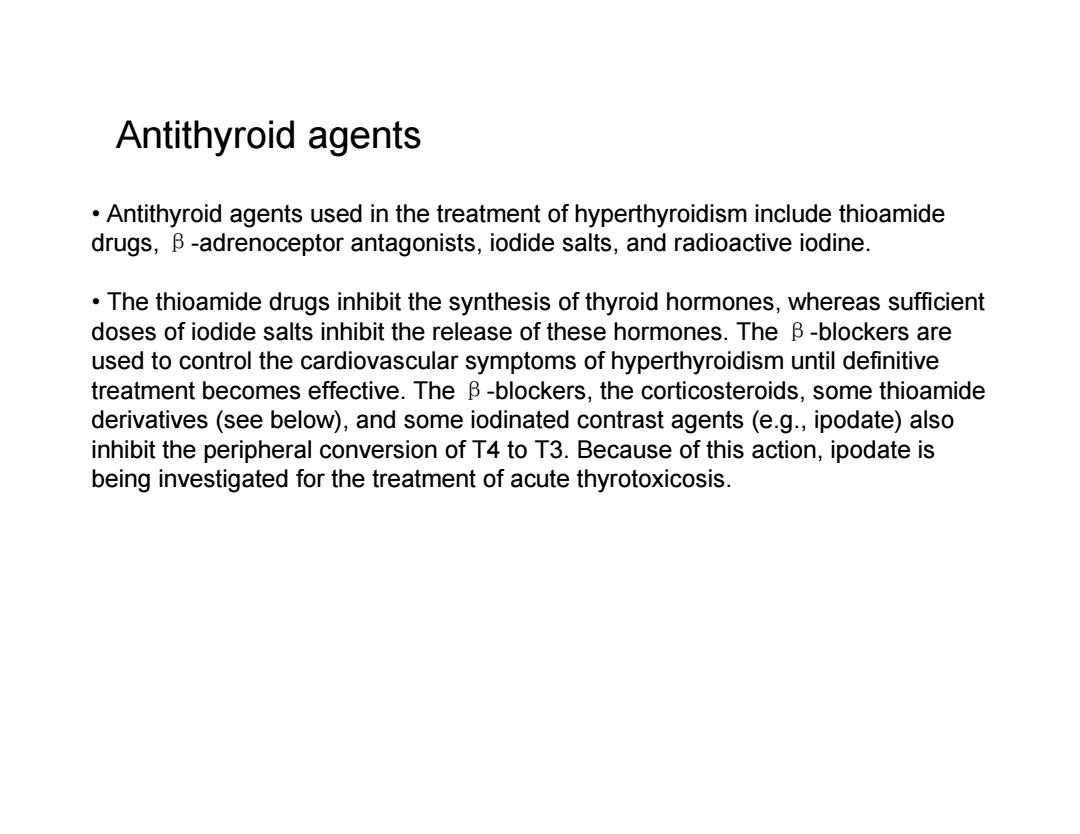
Antithyroid agents Antithyroid agents used in the treatment of hyperthyroidism include thioamide drugs,B-adrenoceptor antagonists,iodide salts,and radioactive iodine. The thioamide drugs inhibit the synthesis of thyroid hormones,whereas sufficient doses of iodide salts inhibit the release of these hormones.The B-blockers are used to control the cardiovascular symptoms of hyperthyroidism until definitive treatment becomes effective.The B-blockers,the corticosteroids,some thioamide derivatives(see below),and some iodinated contrast agents(e.g.,ipodate)also inhibit the peripheral conversion of T4 to T3.Because of this action,ipodate is being investigated for the treatment of acute thyrotoxicosis
Antithyroid agents • Antithyroid agents used in the treatment of hyperthyroidism include thioamide drugs, β-adrenoceptor antagonists, iodide salts, and radioactive iodine. • The thioamide drugs inhibit the synthesis of thyroid hormones, whereas sufficient doses of iodide salts inhibit the release of these hormones. The β-blockers are used to control the cardiovascular symptoms of hyperthyroidism until definitive treatment becomes effective. The β-blockers, the corticosteroids, some thioamide derivatives (see below), and some iodinated contrast agents (e.g., ipodate) also inhibit the peripheral conversion of T4 to T3. Because of this action, ipodate is being investigated for the treatment of acute thyrotoxicosis
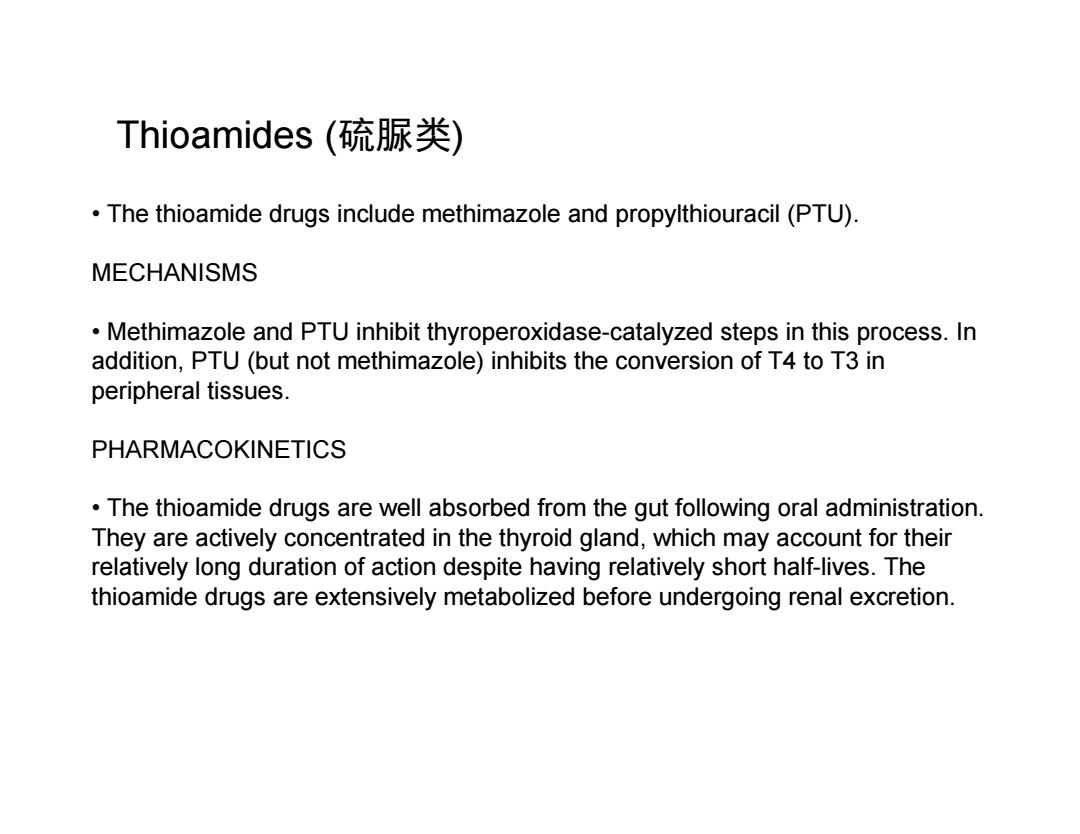
Thioamides(硫脲类) The thioamide drugs include methimazole and propylthiouracil(PTU) MECHANISMS Methimazole and PTU inhibit thyroperoxidase-catalyzed steps in this process.In addition,PTU(but not methimazole)inhibits the conversion of T4 to T3 in peripheral tissues. PHARMACOKINETICS The thioamide drugs are well absorbed from the gut following oral administration. They are actively concentrated in the thyroid gland,which may account for their relatively long duration of action despite having relatively short half-lives.The thioamide drugs are extensively metabolized before undergoing renal excretion
Thioamides (硫脲类) • The thioamide drugs include methimazole and propylthiouracil (PTU). MECHANISMS • Methimazole and PTU inhibit thyroperoxidase-catalyzed steps in this process. In addition, PTU (but not methimazole) inhibits the conversion of T4 to T3 in peripheral tissues. PHARMACOKINETICS • The thioamide drugs are well absorbed from the gut following oral administration. They are actively concentrated in the thyroid gland, which may account for their relatively long duration of action despite having relatively short half-lives. The thioamide drugs are extensively metabolized before undergoing renal excretion

Thioamides(硫脲类) INDICATIONS In patients with Graves'disease,a thioamide drug can be used in an attempt to induce remission or as a means to control symptoms before surgery or RAI treatment.The effects of thioamide drugs are delayed because it takes about 4 to 8 weeks of therapy before the glandular hormone stores are depleted and circulating hormone levels start to return to the normal range.At this time,doses can be gradually tapered at monthly intervals to achieve the desired steady-state thyroid hormone level.If the objective is long-term remission of Graves'disease, patients usually remain on the drug for 12 to 24 months.About 45%of patients will eventually obtain a permanent remission.The mechanisms responsible for remission are uncertain but may involve a reduction in the thyroid-stimulating activity of thyroid antibodies or an alteration of the immunologic defect that stimulated antibody production.Persons with persistent thyroid-stimulating antibodies have a higher incidence of relapse than do persons without persistent antibodies
Thioamides (硫脲类) INDICATIONS • In patients with Graves' disease, a thioamide drug can be used in an attempt to induce remission or as a means to control symptoms before surgery or RAI treatment. The effects of thioamide drugs are delayed because it takes about 4 to 8 weeks of therapy before the glandular hormone stores are depleted and circulating hormone levels start to return to the normal range. At this time, doses can be gradually tapered at monthly intervals to achieve the desired steady-state thyroid hormone level. If the objective is long-term remission of Graves' disease, patients usually remain on the drug for 12 to 24 months. About 45% of patients will eventually obtain a permanent remission. The mechanisms responsible for remission are uncertain but may involve a reduction in the thyroid-stimulating activity of thyroid antibodies or an alteration of the immunologic defect that stimulated antibody production. Persons with persistent thyroid-stimulating antibodies have a higher incidence of relapse than do persons without persistent antibodies
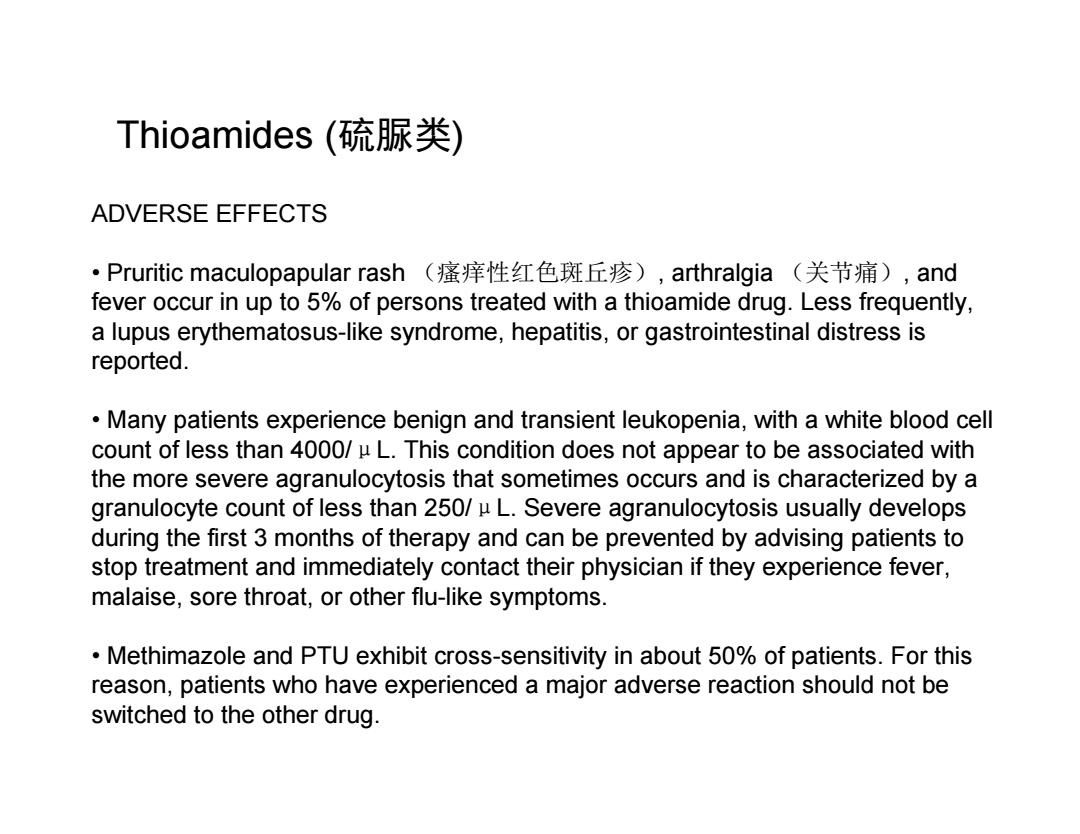
Thioamides(硫脲类) ADVERSE EFFECTS ·Pruritic maculopapular rash(瘙痒性红色斑丘疹),arthralgia(关节痛),and fever occur in up to 5%of persons treated with a thioamide drug.Less frequently, a lupus erythematosus-like syndrome,hepatitis,or gastrointestinal distress is reported. Many patients experience benign and transient leukopenia,with a white blood cell count of less than 4000/u L.This condition does not appear to be associated with the more severe agranulocytosis that sometimes occurs and is characterized by a granulocyte count of less than 250/u L.Severe agranulocytosis usually develops during the first 3 months of therapy and can be prevented by advising patients to stop treatment and immediately contact their physician if they experience fever, malaise,sore throat,or other flu-like symptoms. Methimazole and PTU exhibit cross-sensitivity in about 50%of patients.For this reason,patients who have experienced a major adverse reaction should not be switched to the other drug
Thioamides (硫脲类) ADVERSE EFFECTS • Pruritic maculopapular rash (瘙痒性红色斑丘疹), arthralgia (关节痛), and fever occur in up to 5% of persons treated with a thioamide drug. Less frequently, a lupus erythematosus-like syndrome, hepatitis, or gastrointestinal distress is reported. • Many patients experience benign and transient leukopenia, with a white blood cell count of less than 4000/μL. This condition does not appear to be associated with the more severe agranulocytosis that sometimes occurs and is characterized by a granulocyte count of less than 250/μL. Severe agranulocytosis usually develops during the first 3 months of therapy and can be prevented by advising patients to stop treatment and immediately contact their physician if they experience fever, malaise, sore throat, or other flu-like symptoms. • Methimazole and PTU exhibit cross-sensitivity in about 50% of patients. For this reason, patients who have experienced a major adverse reaction should not be switched to the other drug